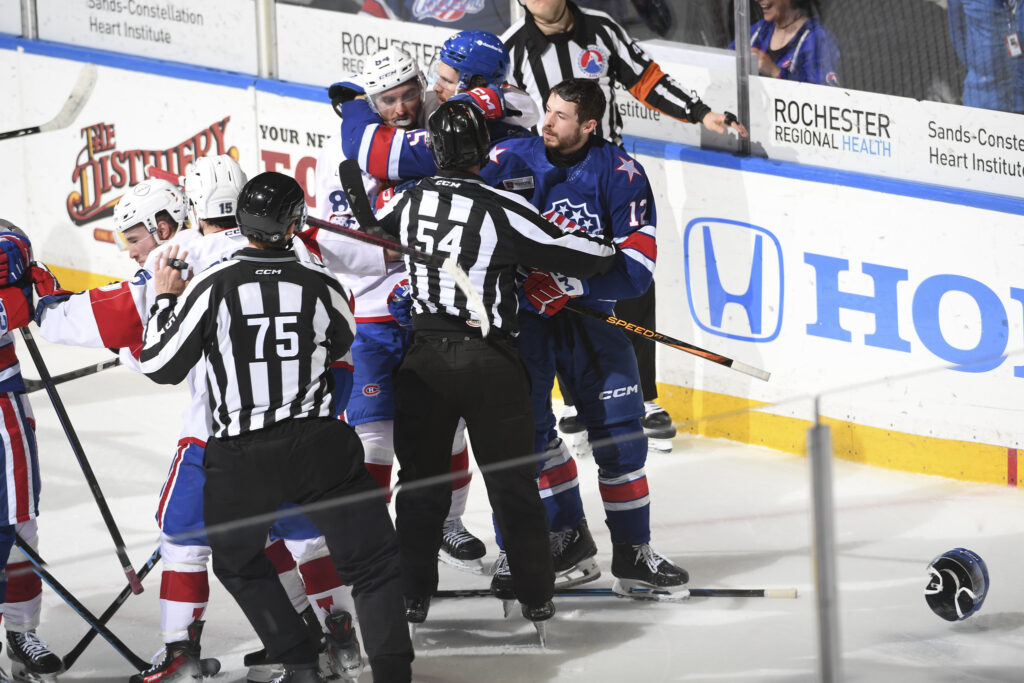
By KEVIN OKLOBZIJA
There’s a popular video captured from the Florida Panthers run to the Stanley Cup last spring that’s splattered across seemingly every social media platform.
With his team leading the second-round series 3-1 against the Boston Bruins, Panthers coach Paul Maurice unleashes a one-for-the-ages verbal tirade on the bench during Game 5. It lasts all of 14 seconds.
“You get a 3-1 lead and now you want to make plays,” an incredulous Maurice screams. “(Bad word) the plays. Pound their (another bad word) D so in Game 7 they got nothing left.”
That pummel-opponents-into-submission strategy is the rage in the NHL, and in the AHL for that matter. It’s always been a trademark of hockey’s playoffs, but it’s been amplified in recent years as players have become bigger, stronger and faster.
Last one limping wins.
The Panthers have the Stanley Cup from last season to prove it works. It worked for the Vegas Golden Knights in 2023. And the Tampa Bay Lightning in 2020 and 2021. The Hershey Bears used a similar style to win the Calder Cup in 2023 and 2024.
And it’s part of why the Rochester Americans, despite a talented roster, have not brought the Calder Cup to Blue Cross Arena at the War Memorial in any of the past three seasons.
They’ve had plenty of skill, and that skill certainly can dominate for stretches in the regular season. They won 42 games this season, pretty impressive in a 72-game season. They finished with a plus-47 goals differential. Of their 92 points, 50 were earned on the road.
But in each of the past three years, despite having good teams and explosive firepower, the roster simply was not built to withstand the pounding of a 20-something-game playoff run.
Yes, the Amerks took the regular-season champion Laval Rocket to a fifth and deciding game in the North Division finals. But with a chance to move on – or go home – they lost 5-0 on Sunday evening.
As Maurice continues to preach to the Panthers, pound their defense. Laval did that all series against the Amerks. The Rocket, far bigger up front and on defense, played a near-perfect game in the series clincher. They took away time, space and the puck shift after shift.
“That was their best version of themselves,” Amerks coach Michael Leone said late Tuesday afternoon following end-of-season meetings with the players.
“Once you get to a Game 5 or Game 7, it’s a real simple game that you have to play,” Leone said. “It’s all about gaining the zones, putting pucks behind, (playing) physical. There’s a lot of directness in their game. They’re heavy. It’s hard to get to the net.”
Having an abundance of size and physicality has an ancillary effect, too: players who wouldn’t necessarily play that style suddenly enjoy doing so.
“You look at (Laval winger Florian) Xhakej, the impact that he has on the game,” Leone said. “He drags guys into the fight and they almost play tougher than they really are. They also have undersized guys, too, but they play a little tougher when they have a guy out there (like Xhakej).
“Everybody plays tougher, everybody’s finishing checks, everybody’s bought in. Because when you win, you start to believe.”
Because big, mean and relentless are difficult qualities to overcome for a smaller team, even if the smaller team does its best to fight back. In reality, while losing Game 5 brought the season to an end, the series was ideal for the prospects of the Buffalo Sabres.
They saw up close and personal what it takes to win in the playoffs.
“Ultimately when you get to this time of the year, you find out who you are as a player,” Leone said.
If nothing else, the Sabres organization learned rookie forward Konsta Helenius is a gamer. Having just turned 19 on May 11, Helenius wasn’t deterred at all by the physicality of the Rocket. He produced 3 goals, 3 assists and 6 points in eight playoff games, including 2-1-3 against Laval.
“He has a lot of tools that translate to the NHL,” Leone said. “His size, skating ability, ability to protect the puck.”
Other young players needed to do more. Rookie Noah Ostlund carried the Amerks offense for a stretch in March but produced just two assists in the playoffs. Rookie forward Anton Wahlberg didn’t have a point in six playoff games. Goalie Devon Levi was brilliant in the first-round sweep of Syracuse but allowed 18 goals to Laval.
They now know what success looks like, and feels like.
Rousek headed to Sweden
Leone had referenced during the playoffs that winger Lukas Rousek was playing through some sort of injury. He revealed on Tuesday that there is a significant meniscus issue in his knee.
“Hat’s off to him,” Leone said. “I can’t say enough about him to persevere. He wanted to be out there.”
His desire to help his team is perhaps more admirable considering he already had a deal wrapped up to play for HV71 of the Swedish League next season.
Rousek, 26, played four seasons with the Amerks. He produced 34-109-143 in 212 regular season games 7-35-42 in playing all 72 games this season) for the Amerks and 9-23-32 in 36 playoff games (2-6-8 this spring). He also played 17 games in Buffalo (1-3-4).




The physicallity and speed in the playoffs is unbelieveable! The refs let stuff go as much as they can. Zone coverage in the 20-30 ft. area around the net is a determining factor. Replays on goals have been key as well. … The Hockey Puck. 🏒
Your article sums it up perfectly Kevin. Amerks have been too small to last in the playoffs. When they needed that grit and determination in game 5, it just wasn’t there at all. Our ‘biggest’ guy Murray was simply a pylon the entire playoffs. We watched Laval perform with a bit of admiration, dislike, and jealousy…because they did what we all wanted our guys to do.
Their #1 goalie Primeau was head an shoulders better than our guy when it mattered most. That Laval chose to play Fowler a couple times gave us some hope, but we knew he wouldn’t be in the nets when the series was on the line.
Kevin I agree with your article to an extent, but the skill could have been enough had the Amerks gotten better production from Kulich in this series and had Levi played the way he did in the Syracuse series. IMO 4 of the 5 games except game 5 were winnable had the Amerks gotten better goaltending. As for the physical part funny how Karmonos mentioned Jagger as a physical player they acquired yet the guy didn’t play 1 game in the playoffs! Komarov and Murray had the size to be a more physical presence in the series but both were very underwhelming! Slaggert also a physical presence didn’t receive a single minute of playing time in the series! Leone had a very poor showing in the coaching department this series. Amerks didn’t play well enough for him not to make 1 lineup change! I can definitely appreciate the Amerks had a lot of success this season and overall Leone had a great season as a rookie coach but do not believe they couldn’t have beaten Laval! The biggest difference is a coach not willing to change anything and the best players underperforming at the worst time.